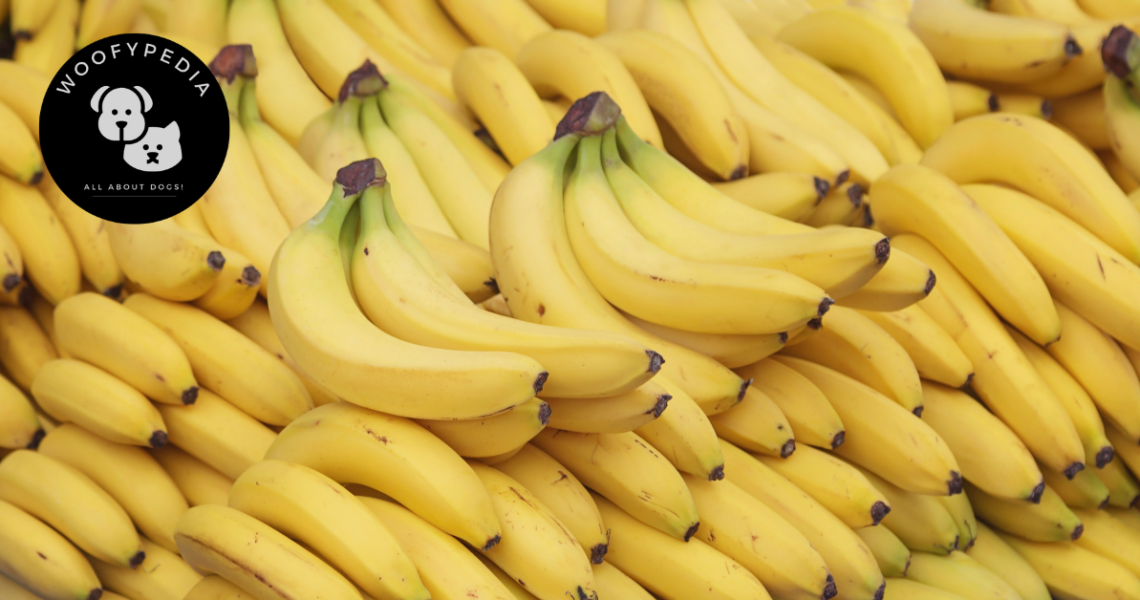Can Dogs Eat Bananas? A Complete Guide for Dog Owners
Can Dogs Eat Bananas?
Yes, dogs can eat bananas! They make a healthy, low-calorie snack when given in moderation! Bananas are rich in essential nutrients like potassium, vitamin C, vitamin B6, biotin, magnesium, and fibre. However, due to their natural sugar content, bananas are more suitable as a treat rather than a staple in your dog’s diet. This guide explores the benefits, potential risks, and creative ways to safely include bananas in your dog’s meals.
Table of Contents
- Why Bananas Are Safe for Dogs
- The Nutritional Profile of Bananas
- Health Benefits of Bananas for Dogs
- Potential Risks of Feeding Bananas to Dogs
- How to Serve Bananas to Your Dog
- Can Puppies Eat Bananas?
- Creative Banana Recipes and Treat Ideas
- FAQs Everything You Need to Know About Feeding Bananas to Dogs
- Conclusion: The Verdict on Bananas for Dogs
Why Bananas Are Safe for Dogs
Bananas are a natural, wholesome fruit that is widely regarded as safe for dogs. Unlike many processed treats, bananas do not contain artificial ingredients or harmful preservatives. They are soft, easy to chew, and versatile, making them suitable for dogs of all ages, from puppies to seniors.
However, as with any treat, moderation is key. Bananas should complement your dog’s diet rather than replace their primary food source. Proper serving sizes and preparation methods ensure that bananas remain a safe and enjoyable addition to your dog’s routine.
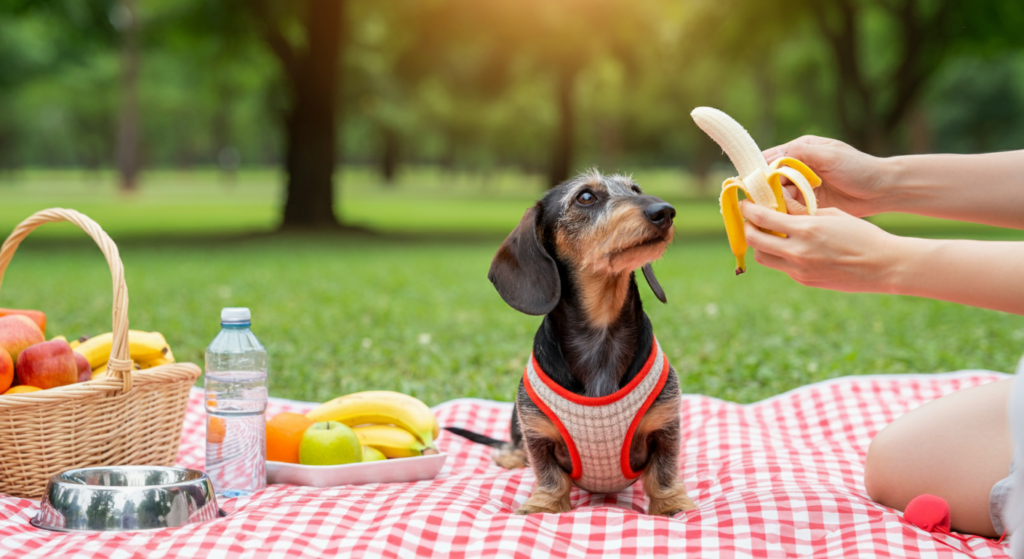
The Nutritional Profile of Bananas
Bananas are more than just a sweet treat; they are a nutritional powerhouse. Below is a breakdown of the key nutrients found in bananas and how they benefit your dog:
- Potassium: Supports heart function, muscle strength, and electrolyte balance.
- Vitamin C: An antioxidant that promotes a healthy immune system.
- Vitamin B6: Aids in brain development, nervous system function, and energy metabolism.
- Magnesium: Supports bone health and protein synthesis.
- Dietary Fibre: Aids digestion and helps regulate bowel movements.
- Natural Sugars: Provides a quick energy boost for active dogs.
Nutritional Content of 100g of Banana vs. a Medium-Sized Dog’s Recommended Daily Allowance (RDA)
| Nutrient | Amount in 100g of Banana | Percentage of a Medium-Sized Dog’s RDA | RDA for a 20kg Dog |
|---|---|---|---|
| Calories | 89 | ~4.5% | ~2,000 kcal/day |
| Carbohydrates | 22.8g | ~9% | ~250g/day |
| Sugars | 12.2g | – | Minimize |
| Fibre | 2.6g | ~10% | ~25g/day |
| Protein | 1.1g | ~1.8% | ~60g/day |
| Fat | 0.3g | Negligible | ~20g/day |
| Potassium | 358mg | ~8% | ~4,500mg/day |
| Magnesium | 27mg | ~9% | ~300mg/day |
| Vitamin C | 8.7mg | ~17% | ~50mg/day |
| Vitamin B6 | 0.37mg | ~24% | ~1.5mg/day |
Notes:
- Calories: At 89 kcal per 100g, bananas are a moderate-calorie snack for dogs. A few small pieces can provide energy without exceeding daily needs.
- Potassium and Magnesium: Beneficial for muscle function and recovery, these minerals make bananas a healthy occasional treat.
- Fibre: Aids digestion but should be balanced with other dietary components to prevent excessive fibre intake.
- Sugars: While natural, the sugar content reinforces why bananas should be offered sparingly.
This table provides insight into how 100g of banana compares to a medium-sized dog’s nutritional requirements. Always feed in moderation, with portion sizes adjusted to your dog’s weight and activity level. Like many fruits Bananas have a great nutrient content but an abundance of sugars mean that they can only be fed in small treat size amounts.
Health Benefits of Bananas for Dogs
1. Boosts Digestive Health
Bananas are rich in fibre, which can help regulate your dog’s digestive system. They may be beneficial for dogs experiencing mild constipation, although overfeeding can have the opposite effect.
2. Promotes Heart and Muscle Health
Potassium, a key nutrient in bananas, supports heart health and ensures proper muscle contractions. Active and athletic dogs, in particular, can benefit from this mineral.
3. Natural Energy Source
The natural sugars in bananas provide a quick energy boost, making them an excellent snack before a long walk or an active play session.
4. Supports Immune Function
Vitamin C in bananas acts as an antioxidant, reducing inflammation and supporting your dog’s immune response.

Potential Risks of Feeding Bananas to Dogs
While bananas are generally safe, there are a few risks to be aware of:
1. Overfeeding and Obesity
Bananas are high in natural sugars. Feeding too much can lead to weight gain, particularly in less active dogs or those predisposed to obesity.
2. Allergies
Although rare, some dogs may be allergic to bananas. Signs of an allergic reaction include itching, swelling, or gastrointestinal upset. If these symptoms occur, stop feeding bananas immediately and consult your vet.
3. Choking Hazard
The tough skin of a banana can be difficult to digest and may pose a choking hazard. Always remove the peel before serving.
4. Digestive Upset
Feeding too many bananas can cause diarrhoea or constipation. Stick to small portions to avoid upsetting your dog’s stomach.
How to Serve Bananas to Your Dog
To ensure bananas are a safe and enjoyable treat, follow these tips:
Proper Portion Sizes
- Small Dogs: 2–3 small slices.
- Medium Dogs: 4–5 small slices.
- Large Dogs: Half a banana.
Preparation Tips
- Remove the peel: The skin is not toxic but is difficult to digest and may cause blockages.
- Serve in small pieces: This reduces the risk of choking and makes it easier for your dog to enjoy.
Fresh or Frozen?
- Fresh bananas are soft and easy to chew, perfect for dogs with sensitive teeth.
- Frozen banana slices make a refreshing treat during summer.
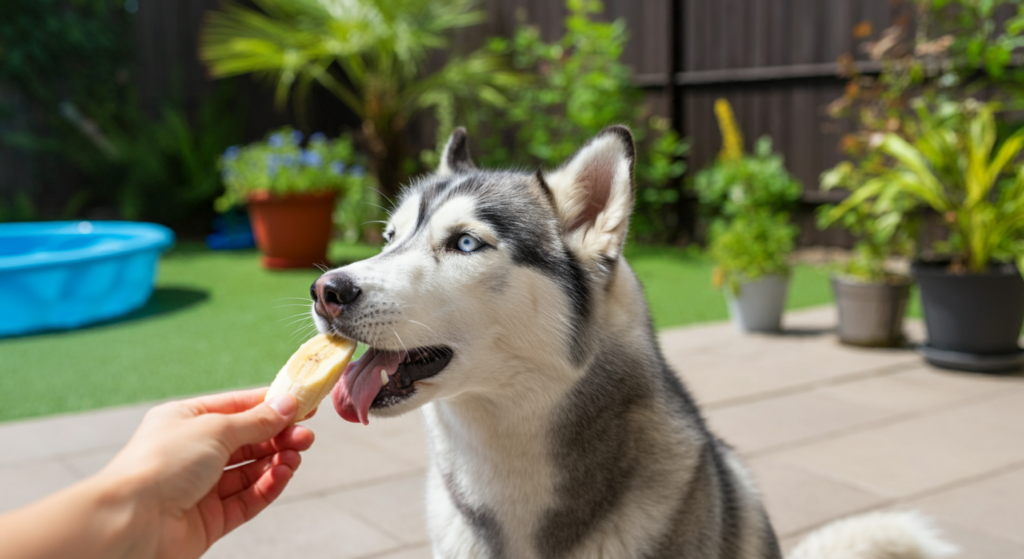
Can Puppies Eat Bananas?
Yes, puppies can eat bananas, but only in moderation. Their digestive systems are still developing, so it’s important to start with very small pieces and monitor for any adverse reactions. Puppies require a balanced diet tailored to their growth needs, so banana treats should not replace their regular meals.
Creative Banana Recipes and Treat Ideas
Looking to spice up your dog’s treat menu? Here are some easy, dog-friendly banana recipes:
1. Banana and Peanut Butter Frozen Bites
- Ingredients: 1 ripe banana, 2 tablespoons of unsweetened peanut butter.
- Method: Mash the banana, mix with peanut butter, and spoon into silicone moulds. Freeze for 2–3 hours before serving.
2. Banana and Oatmeal Biscuits
- Ingredients: 1 ripe banana, 1 cup of oats, a splash of water.
- Method: Mash the banana, mix with oats, and form a dough. Roll into small balls or shapes, then bake at 180°C for 15–20 minutes.
3. Banana and Yoghurt Pupsicles
- Ingredients: 1 banana, 1 cup of plain, unsweetened yoghurt.
- Method: Blend the banana and yoghurt, pour into ice cube trays, and freeze.
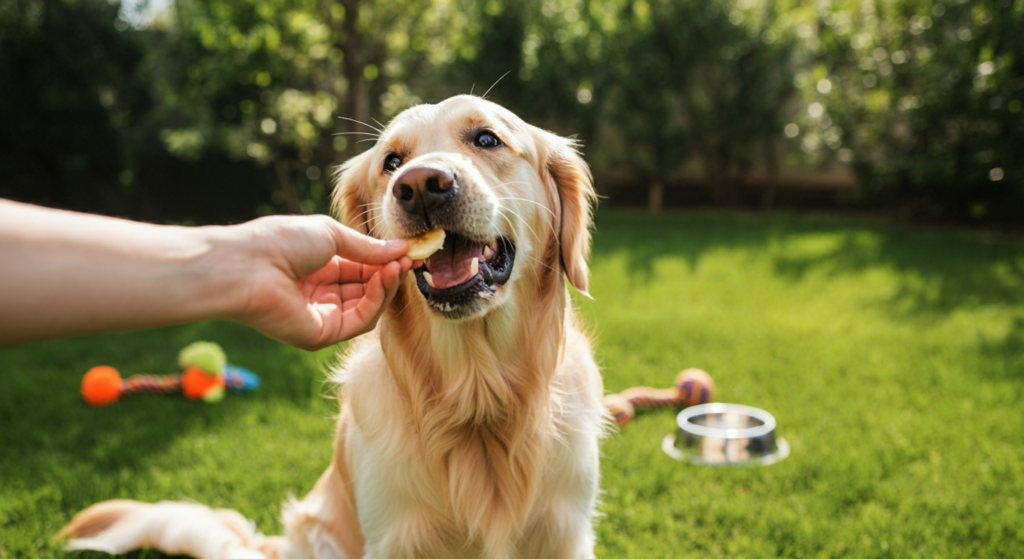
FAQ: Everything You Need to Know About Feeding Bananas to Dogs
Bananas are a popular treat for dogs, but it’s natural to have questions about how much, how often, and how safe they really are. Here’s a comprehensive FAQ to address all your concerns, ensuring your furry friend enjoys bananas responsibly and benefits from their nutrients.
Click on each heading for more information …..
1. How much banana can I give my dog?
The right portion size depends on your dog’s size:
- Small dogs: 1–2 thin slices.
- Medium dogs: 3–4 slices or about a quarter of a banana.
- Large dogs: Up to half a banana.
Always offer bananas in moderation as an occasional treat, not a regular meal replacement.
2. Do bananas settle a dog’s stomach?
Yes, bananas can help settle a dog’s stomach in certain cases. The fibre in bananas helps regulate digestion, while their natural sugars provide a gentle energy boost. They can be especially soothing for dogs experiencing mild diarrhoea or upset stomachs.
3. Why can’t dogs eat bananas?
Dogs can eat bananas safely in moderation. However, overfeeding or improper serving (e.g., with the peel) can lead to digestive upset, weight gain, or choking risks. Bananas are not inherently harmful but should be fed responsibly.
4. Does banana firm up dog stool?
Yes, bananas can firm up a dog’s stool in cases of mild diarrhoea. The soluble fibre and pectin in bananas absorb excess water in the intestines, helping stabilise loose stools. Serve a small portion to achieve this effect.
5. Is banana a laxative for dogs?
Yes, bananas can act as a mild laxative for dogs. Their fibre content can help soften stools and promote regular bowel movements, making them helpful for mild constipation. Be cautious not to overfeed, as too much can lead to diarrhoea.
6. Do bananas make dogs sleep?
While bananas don’t directly make dogs sleep, their magnesium and tryptophan content can promote relaxation. This may help your dog unwind and improve their overall sleep quality, especially if given as a treat in the evening.
7. Is a banana a day too much for a dog?
Yes, a banana a day is generally too much for a dog. While bananas are healthy, their natural sugar content can lead to weight gain or digestive issues if overfed. Stick to 1–2 slices for small dogs and up to half a banana for large dogs, offered 2–3 times a week.
8. Can I give my dog a frozen banana?
Yes, frozen bananas are safe and can be a refreshing treat, especially in warm weather. Slice the banana into small, manageable pieces before freezing to avoid choking hazards.
9. Why do dogs love bananas?
Dogs love bananas for their natural sweetness, soft texture, and mild aroma. The fruit’s appealing flavour and nutrient content make it an enjoyable treat for most dogs.
10. Can dogs eat banana skin?
No, dogs should not eat banana skin. Banana peels are tough and difficult to digest, potentially causing choking or intestinal blockages. Always peel the banana before serving it to your dog.
11. What are the side effects of bananas for dogs?
Potential side effects include:
- Digestive upset: Overfeeding can lead to diarrhoea, constipation, or bloating.
- Weight gain: Bananas contain natural sugars that may contribute to weight gain if given in excess.
- Allergic reactions: Rare but possible, symptoms include vomiting, diarrhoea, or itching.
12. Do bananas upset dogs’ stomachs?
Bananas generally don’t upset a dog’s stomach when fed in moderation. However, overfeeding or introducing them too quickly can cause diarrhoea, gas, or bloating. Start with a small portion and monitor your dog’s reaction.
13. Can I give my dog a piece of banana every day?
While a small piece daily may not harm most dogs, it’s better to limit bananas to 2–3 times a week. Daily feeding can lead to excessive sugar intake and disrupt a balanced diet.
14. Why did my dog vomit after eating banana?
Your dog may have vomited after eating a banana due to:
- Overfeeding.
- Eating too quickly.
- Sensitivity or intolerance to bananas.
- Ingesting the banana peel.
Monitor your dog’s reaction and consult your vet if vomiting persists.
15. What is the best time to eat bananas?
For dogs, bananas are best given:
- In the morning: As part of breakfast or an energy-boosting snack.
- Before or after exercise: To replenish energy or aid muscle recovery.
- As an occasional evening treat: To promote relaxation before bedtime.
This FAQ serves as a comprehensive guide to feeding bananas to your dog. When offered responsibly, bananas can be a healthy and enjoyable treat for your furry friend!
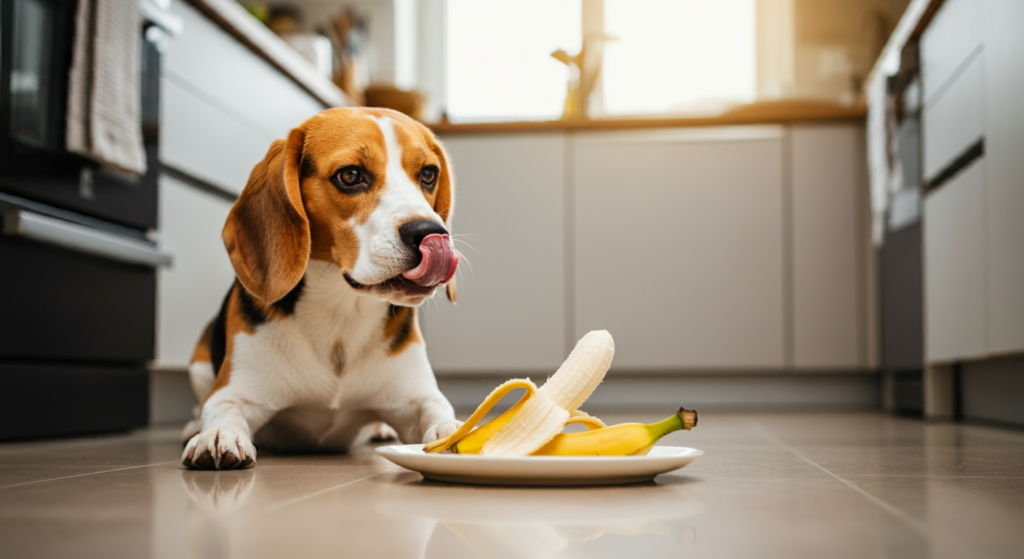
Conclusion: The Verdict on Bananas for Dogs
Bananas are a safe, nutritious, and tasty treat for dogs when given in moderation. They provide essential vitamins and minerals while offering a natural alternative to processed treats. However, as with any snack, it’s important to serve them correctly and balance them with your dog’s overall diet.
By incorporating bananas into your dog’s snack routine, you can provide a healthy and enjoyable treat that supports their well-being. Try out some of the recipes above, or simply slice up a fresh banana and let your pup enjoy!
This extended version includes even more detail, practical advice, and creative ideas. Let me know if you’d like to refine it further!
If you have any doubts or concerns when feeding anything to your dog or pets then ALWAYS consult your veterinary practice for their tailored advice.
